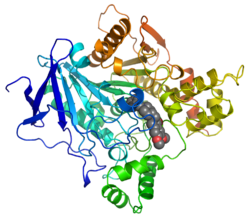Biology:Donepezil
 | |
| Clinical data | |
|---|---|
| Trade names | Aricept, Adlarity, others |
| Other names | Donepezil hydrochloride (USAN US) |
| AHFS/Drugs.com | Monograph |
| MedlinePlus | a697032 |
| License data | |
| Pregnancy category |
|
| Routes of administration | By mouth, transdermal |
| ATC code | |
| Legal status | |
| Legal status | |
| Pharmacokinetic data | |
| Bioavailability | 100%[4][5] |
| Protein binding | 96%, albumin (about 75%) and alpha1-acid glycoprotein (21%).[5][4] |
| Metabolism | CYP2D6, CYP3A4, and glucuronidation.[4] Four major metabolites, two of which are active.[5][4] |
| Onset of action | Peak plasma levels in 3–4 h.[5][4] |
| Elimination half-life | 70 hours[6] Around 100 hours in elderly patients.[4] |
| Duration of action | With daily dosing, steady-state concentration is reached in 15–21 days.[5][4] |
| Excretion | 0.11–0.13 (L/h/kg); excreted mostly by the kidneys. Around 17% is excreted unchanged in the urine. About 15% to 20% is excreted in feces.[4][5] Steady-state clearance is similar at all ages.[4] |
| Identifiers | |
| |
| CAS Number | |
| PubChem CID | |
| IUPHAR/BPS | |
| DrugBank | |
| ChemSpider | |
| UNII | |
| KEGG | |
| ChEBI | |
| ChEMBL | |
| PDB ligand | |
| Chemical and physical data | |
| Formula | C24H29NO3 |
| Molar mass | 379.500 g·mol−1 |
| 3D model (JSmol) | |
| Chirality | Racemic mixture |
| |
| |
| (verify) | |
Donepezil, sold under the brand name Aricept among others, is a medication used to treat dementia of the Alzheimer's type.[2][3][7] It appears to result in a small benefit in mental function and ability to function.[8] Use, however, has not been shown to change the progression of the disease.[9] Treatment should be stopped if no benefit is seen.[10] It is taken by mouth or via a transdermal patch.[2][3][7]
Common side effects include nausea, trouble sleeping, aggression, diarrhea, feeling tired, and muscle cramps.[7][10] Serious side effects may include abnormal heart rhythms, urinary incontinence, and seizures.[7] Donepezil is a centrally acting reversible acetylcholinesterase inhibitor and structurally unrelated to other anticholinesterase agents.[7][4]
Donepezil was approved for medical use in the United States in 1996.[7] It is available as a generic medication.[10] In 2020, it was the 112th most commonly prescribed medication in the United States, with more than 5 million prescriptions.[11][12]
Medical uses
Alzheimer's disease
There is no evidence that donepezil or other similar agents alter the course or progression of Alzheimer's disease. Six-to-twelve-month controlled studies have shown modest benefits in cognition or behavior.[13] The UK National Institute for Clinical Excellence (NICE) recommends donepezil as an option in the management of mild to moderate Alzheimer's disease.[14] The person should, however, be reviewed frequently and if there is no significant benefit it should be stopped.[14] In 2006, the U.S. Food and Drug Administration (FDA) also approved donepezil for treatment of mild, moderate and severe dementia in Alzheimer's disease.[15]
Other
- Lewy body dementia: Some studies have shown benefits of donepezil for the treatment of cognitive and behavioral symptoms in Lewy body dementia.[4]
- Traumatic brain injury: Some research suggests an improvement in memory dysfunction in patients with traumatic brain injury with donepezil use.[4]
- Vascular dementia: Studies have shown that donepezil may improve cognition in patients with vascular dementia but not overall global functioning.[4]
- Dementia associated with Parkinson disease: Some evidence suggests that donepezil can improve cognition, executive function, and global status in Parkinson disease dementia.[4]
Adverse effects
In clinical trials the most common adverse events leading to discontinuation were nausea, diarrhea, and vomiting.[2][16] Other side effects included difficulty sleeping, muscle cramps and loss of appetite. Most side effects were observed in patients taking the 23 mg dose compared to 10 mg or lower doses. Side effects are mild and transient in most patients, lasting up to three weeks and usually improved even with continued use.[2][4]
Donepezil, like other cholinesterase inhibitors, can cause nightmares due to enhanced activation of the visual association cortex during REM sleep.[4] Dosing donepezil in the morning can reduce the frequency of nightmares.[4]
Precautions
Donepezil should be used with caution in people with heart disease, cardiac conduction disturbances, chronic obstructive pulmonary disease, asthma, severe cardiac arrhythmia and sick sinus syndrome.[2]
People with peptic ulcer disease or taking NSAIDs should use with caution because increased risk of gastrointestinal bleeding was noted.[2] Slow heart beat and fainting in people with heart problems were also seen. These symptoms may appear more frequent when initiating treatment or increasing the donepezil dose. Although occurrence of seizures is rare, people who have a predisposition to seizures should be treated with caution.[2]
If daily donepezil has suspended for 7 days or less, restarting at the same dose is recommended, while if the suspension lasts longer than 7 days, retitrate from 5 mg daily is suggested.[17][18]
Mechanism of action
Donepezil binds and reversibly inhibits enzymes called cholinesterases, especially acetylcholinesterase, thus inhibiting hydrolysis of acetylcholine. This increases acetylcholine concentrations at cholinergic synapses.[4]
The precise mechanism of action of donepezil in patients with Alzheimer's disease is not fully understood. Certainly, Alzheimer's disease involves a substantial loss of the elements of the cholinergic system and it is generally accepted that the symptoms of Alzheimer's disease are related to this cholinergic deficit, particularly in the cerebral cortex and other areas of the brain.[19][20]
In addition to its actions as an acetylcholinesterase inhibitor, donepezil has been found to act as a potent agonist of the σ1 receptor (Ki = 14.6 nM), and has been shown to produce specific antiamnestic effects in animals mainly via this action.[21]
Some noncholinergic mechanisms have also been proposed.[4] Donepezil upregulates the nicotinic receptors in the cortical neurons, adding to neuroprotective activity.[4] It inhibits voltage-activated sodium currents reversibly and delays rectifier potassium currents and fast transient potassium currents, although this action is unlikely to contribute to clinical effects.[4]
Synergy
Donepezil was claimed to act synergistically with an agent called FK962 [283167-06-6][22] & FK960 [133920-70-4].[23] {potential activation of somatostatinergic neurotransmission} However, the development was discontinued after Phase II "since the data reviewed did not indicate clear efficacy of the compound for the treatment of mild to moderate Alzheimer’s disease."[24]
Stereochemistry
Donepezil medications are racemates.[25]
| Enantiomers | |
|---|---|
 (R)-Donepezil |
 (S)-Donepezil |
History
Research leading to the development of donepezil began in 1983, at Eisai, and in 1996, Eisai received approval from the United States Food and Drug Administration (FDA) for donepezil under the brand Aricept, which it co-marketed with Pfizer.[27] The team at Eisai was led by Hachiro Sugimoto.[28]
As of 2011, Aricept was the world's best-selling Alzheimer's disease treatment.[29] The first generic donepezil became available in November 2010, with the US FDA approval of a formulation prepared by Ranbaxy Labs.[30]
Research
Donepezil has been tested in other cognitive disorders, including Lewy body dementia,[31] and vascular dementia,[32] but it is not currently approved for these indications. Donepezil has also been found to improve sleep apnea in people with Alzheimer's.[33] It also improves gait in people with mild Alzheimer's.[34]
Donepezil has also been studied in people with mild cognitive impairment, schizophrenia, attention deficit disorder, post-coronary artery bypass surgery cognitive impairment,[35] cognitive impairment associated with multiple sclerosis, CADASIL syndrome, and Down syndrome. A three-year National Institutes of Health trial in people with mild cognitive impairment reported donepezil was superior to placebo in delaying rate of progression to dementia during the initial 18 months of the study, but this was not sustained at 36 months.[36] In a secondary analysis, a subgroup of individuals with the apolipoprotein E4 genotype showed sustained benefits with donepezil throughout the study.[37] At this time, though, donepezil is not indicated for prevention of dementia.
Cognitive enhancement
Donepezil has shown mixed results for improving cognitive abilities in healthy individuals.[38][39][40][41] A 2009 double-blind, placebo controlled study (n=24) investigating donepezil's effects across a variety of memory tests in reported an improvement in spatial memory accuracy both before (90 minutes after dosing) and at theoretical Tmax (210 minutes after dosing).[40] However, a later 2011 paper featuring two study double-blind, placebo controlled experiments evaluating donepezil's effects in older but healthy subjects reported impairment after acute (5 hours after dose) and chronic (4 weeks) donepezil administration.[41]
ADHD
The addition of donepezil with existing ADHD medications has shown mixed results.[42] In those with Tourette syndrome and ADHD, donepezil may reduce tics while it had no effect on ADHD's symptoms.[42]
Pervasive developmental disorder
Donepezil, along with other cholinesterase inhibitors, is suggested as having potential for trouble behaviors: irritability, hyperactivity, and difficulty in social communication which are typically seen in those with pervasive developmental disorder, pervasive developmental disorder not otherwise specified, and autism-spectrum disorder.[42]
Anorexia nervosa
Donepezil is furthermore suggested as a feasible therapeutic option for anorexia nervosa. Emerging literature reports that a subset of patients suffering from restrictive anorexia nervosa have enhanced habit formation compared with healthy controls. Habit formation is modulated by striatal cholinergic interneurons.[43] Based on the physiopathology of anorexia nervosa, namely in terms of cholinergic deficiencies, the effects of donepezil and other drugs that act as cholinesterase inhibitors could thus be effective in the treatment of the disorder.[44]
References
- ↑ "Donepezil Hydrochloride 10 mg Film-coated tablets". https://www.medicines.org.uk/emc/product/6065/smpc#gref.
- ↑ 2.0 2.1 2.2 2.3 2.4 2.5 2.6 2.7 "Aricept- donepezil hydrochloride tablet, film coated Aricept ODT- donepezil hydrochloride tablet, orally disintegrating". 23 December 2021. https://dailymed.nlm.nih.gov/dailymed/drugInfo.cfm?setid=98e451e1-e4d7-4439-a675-c5457ba20975.
- ↑ 3.0 3.1 3.2 "Adlarity- donepezil hydrochloride patch". 11 March 2022. https://dailymed.nlm.nih.gov/dailymed/drugInfo.cfm?setid=1cb44c65-00e8-4b5c-99c2-ad15173115a0.
- ↑ 4.00 4.01 4.02 4.03 4.04 4.05 4.06 4.07 4.08 4.09 4.10 4.11 4.12 4.13 4.14 4.15 4.16 4.17 4.18 4.19 4.20 "Donepezil". StatPearls. Treasure Island (FL): StatPearls Publishing. 2020. http://www.ncbi.nlm.nih.gov/books/NBK513257/. Retrieved 12 April 2020.
- ↑ 5.0 5.1 5.2 5.3 5.4 5.5 "Donepezil: a review". Expert Opinion on Drug Metabolism & Toxicology (Informa Healthcare) 1 (3): 527–536. October 2005. doi:10.1517/17425255.1.3.527. PMID 16863459. "there is a linear relationship between dose and pharmacodynamic effects, measured as red blood cell acetylcholinesterase inhibition and clinical efficacy. Despite being 96% bound to plasma proteins, it has few interactions with other drugs, and the 5-mg dose can be given safely to patients with mild-to-moderate hepatic and renal-disease.".
- ↑ "Donepezil". Profiles of Drug Substances, Excipients and Related Methodology. 35. Elsevier. 2010. pp. 117–50. doi:10.1016/s1871-5125(10)35003-5. ISBN 978-0-12-380884-4. "Plasma donepezil concentrations decline with a half-life of approximately 70 h. Sex, race, and smoking history have no clinically significant influence on plasma concentrations of donepezil [46–51]."
- ↑ 7.0 7.1 7.2 7.3 7.4 7.5 "Donepezil Hydrochloride Monograph for Professionals". American Society of Health-System Pharmacists. https://www.drugs.com/monograph/donepezil.html.
- ↑ "Donepezil for dementia due to Alzheimer's disease". The Cochrane Database of Systematic Reviews 2018 (6): CD001190. June 2018. doi:10.1002/14651858.CD001190.pub3. PMID 29923184.
- ↑ Swedish Council on Health Technology Assessment (June 2008). "Dementia – Caring, Ethics, Ethnical and Economical Aspects: A Systematic Review". SBU Systematic Reviews. PMID 28876770.
- ↑ 10.0 10.1 10.2 British national formulary : BNF 76 (76 ed.). Pharmaceutical Press. 2018. pp. 300. ISBN 9780857113382.
- ↑ "The Top 300 of 2020". https://clincalc.com/DrugStats/Top300Drugs.aspx.
- ↑ "Donepezil – Drug Usage Statistics". https://clincalc.com/DrugStats/Drugs/Donepezil.
- ↑ "Is donepezil effective for treating Alzheimer's disease?". Canadian Family Physician 45: 917–919. April 1999. PMID 10216789.
- ↑ 14.0 14.1 "Donepezil, galantamine, rivastigmine and memantine for the treatment of Alzheimer's disease | Guidance and guidelines | NICE". 23 March 2011. https://www.nice.org.uk/guidance/TA217/chapter/1-Guidance.
- ↑ "FDA Approves Expanded Use of Treatment for Patients With Severe Alzheimer's Disease". FDA (Press release). 13 October 2006. Archived from the original on 10 July 2009.
- ↑ "Pharmacodynamic, pharmacokinetic and pharmacogenetic aspects of drugs used in the treatment of Alzheimer's disease". Clinical Pharmacokinetics 52 (4): 225–241. April 2013. doi:10.1007/s40262-013-0038-9. PMID 23408070.
- ↑ "Donepezil: MedlinePlus Drug Information". 22 December 2019. https://medlineplus.gov/druginfo/meds/a697032.html. "If you forget to take a dose of donepezil, skip the missed dose and continue your regular dosing schedule. Do not take a double dose to make up for a missed one. If you do not take donepezil, for 1 week or longer, you should call your doctor before starting to take this medication again."
- ↑ "Table 4. NHS Guideline". p. 6 of 11. http://www.bucksformulary.nhs.uk/docs/Guideline_786FM.pdf. "Re-titration following AChEI missed doses or planned treatment breaks"
- ↑ "Selective loss of central cholinergic neurons in Alzheimer's disease". Lancet 2 (8000): 1403. December 1976. doi:10.1016/s0140-6736(76)91936-x. PMID 63862.
- ↑ "The cholinergic system in Alzheimer's disease". Progress in Neurobiology 52 (6): 511–535. August 1997. doi:10.1016/s0301-0082(97)00028-2. PMID 9316159.
- ↑ "The pharmacology of sigma-1 receptors". Pharmacology & Therapeutics 124 (2): 195–206. November 2009. doi:10.1016/j.pharmthera.2009.07.001. PMID 19619582.
- ↑ "FK962 and donepezil act synergistically to improve cognition in rats: potential as an add-on therapy for Alzheimer's disease". Pharmacology, Biochemistry, and Behavior 98 (1): 76–80. March 2011. doi:10.1016/j.pbb.2010.11.019. PMID 21130801.
- ↑ "Combination of a novel antidementia drug FK960 with donepezil synergistically improves memory deficits in rats". Pharmacology, Biochemistry, and Behavior 73 (3): 511–519. October 2002. doi:10.1016/S0091-3057(02)00819-5. PMID 12151024.
- ↑ "Astellas Discontinues Development of Alzheimer's Disease Compound FK962". July 18, 2006. https://www.astellas.com/en/system/files/news/2018-06/060718-1_eg_0.pdf.
- ↑ Rote Liste Service GmbH (Hrsg.): Rote Liste 2017 – Arzneimittelverzeichnis für Deutschland (einschließlich EU-Zulassungen und bestimmter Medizinprodukte). Rote Liste Service GmbH, Frankfurt/Main, 2017, Aufl. 57, ISBN:978-3-946057-10-9, S. 178.
- ↑ Proteopedia 1eve
- ↑ "Donepezil: an important prototype to the design of new drug candidates for Alzheimer's disease". Mini Reviews in Medicinal Chemistry 14 (1): 2–19. January 2014. doi:10.2174/1389557513666131119201353. PMID 24251806.
- ↑ "Developed the magic bullet for Alzheimer's disease after overcoming many difficulties (Hachiro Sugimoto)". Chuo University Gakuin Jihou (ChuOnline). https://yab.yomiuri.co.jp/adv/chuo/dy/people/20100819.html.
- ↑ "Eisai Aricept Patch for Alzheimer's Isn't Ready for Approval". Bloomberg. 25 April 2011. https://www.bloomberg.com/news/2011-04-25/eisai-says-fda-indicates-aricept-nda-not-ready-for-approval.html.
- ↑ "Ranbaxy gets FDA nod for Alzheimer's drug". The Indian Express (New Delhi, India: Indian Express Group): IndianExpress.com. 30 November 2010. http://www.indianexpress.com/news/ranbaxy-gets-fda-nod-for-alzheimers-drug/718059/.
- ↑ "Successful use of donepezil for the treatment of dementia with Lewy bodies". The Annals of Pharmacotherapy 35 (2): 202–205. February 2001. doi:10.1345/aph.10192. PMID 11215841.
- ↑ "Donepezil for vascular cognitive impairment". The Cochrane Database of Systematic Reviews (1): CD004395. 2004. doi:10.1002/14651858.CD004395.pub2. PMID 14974068.
- ↑ "Donepezil improves obstructive sleep apnea in Alzheimer disease: a double-blind, placebo-controlled study". Chest 133 (3): 677–683. March 2008. doi:10.1378/chest.07-1446. PMID 18198262. http://www.chestjournal.org/cgi/pmidlookup?view=long&pmid=18198262.
- ↑ "Donepezil improves gait performance in older adults with mild Alzheimer's disease: a phase II clinical trial". Journal of Alzheimer's Disease 43 (1): 193–199. January 2015. doi:10.3233/JAD-140759. PMID 25079803.
- ↑ "Donepezil for cognitive decline following coronary artery bypass surgery: a pilot randomized controlled trial". Psychopharmacology Bulletin 40 (2): 54–62. 2007. PMID 17514186.
- ↑ "Clinical trials in mild cognitive impairment: lessons for the future". Journal of Neurology, Neurosurgery, and Psychiatry 77 (4): 429–438. April 2006. doi:10.1136/jnnp.2005.072926. PMID 16306154.
- ↑ "Vitamin E and donepezil for the treatment of mild cognitive impairment". The New England Journal of Medicine 352 (23): 2379–2388. June 2005. doi:10.1056/nejmoa050151. PMID 15829527.
- ↑ "Cholinergic augmentation modulates visual task performance in sleep-deprived young adults". The Journal of Neuroscience 28 (44): 11369–11377. October 2008. doi:10.1523/JNEUROSCI.4045-08.2008. PMID 18971479.
- ↑ "Cholinergic enhancement reduces spatial spread of visual responses in human early visual cortex". Neuron 60 (5): 904–914. December 2008. doi:10.1016/j.neuron.2008.09.038. PMID 19081383.
- ↑ 40.0 40.1 "Acute cognitive effects of donepezil in young, healthy volunteers". Human Psychopharmacology 24 (6): 453–464. August 2009. doi:10.1002/hup.1044. PMID 19637397.
- ↑ 41.0 41.1 "Donepezil impairs memory in healthy older subjects: behavioural, EEG and simultaneous EEG/fMRI biomarkers". PLOS ONE 6 (9): e24126. 2011-09-08. doi:10.1371/journal.pone.0024126. PMID 21931653. Bibcode: 2011PLoSO...624126B.
- ↑ 42.0 42.1 42.2 Clinical handbook of psychotropic drugs for children and adolescents. Boston, MA: Hogrefe. 2019. pp. 366–69. ISBN 978-1-61676-550-7. OCLC 1063705924.
- ↑ "Cholinergic dysfunction in the dorsal striatum promotes habit formation and maladaptive eating". The Journal of Clinical Investigation 130 (12): 6616–6630. December 2020. doi:10.1172/JCI138532. PMID 33164988.
- ↑ "Donepezil (aricept) as a treatment for anorexia nervosa: a very feasible therapeutic possibility". Expert Opinion on Investigational Drugs 18 (5): 569–571. May 2009. doi:10.1517/13543780902810360. PMID 19388874.
Further reading
- Pharmacology. Philadelphia: W. B. Saunders. 2000. ISBN 978-0-7216-7757-6.
- Compendium of Pharmaceuticals and Specialities (25th ed.). Canadian Pharmacists Association. 2000. ISBN 978-0-919115-76-7.
External links
- "Donepezil". Drug Information Portal. U.S. National Library of Medicine. https://druginfo.nlm.nih.gov/drugportal/name/donepezil.
- "Donepezil hydrochloride". Drug Information Portal. U.S. National Library of Medicine. https://druginfo.nlm.nih.gov/drugportal/name/donepezil%20hydrochloride.
 |



